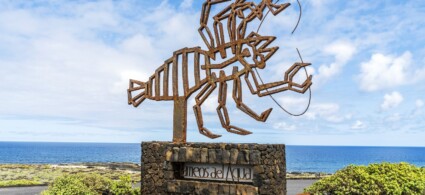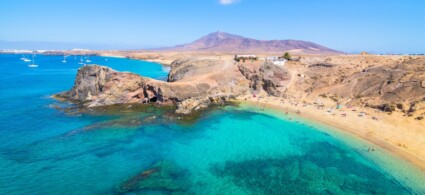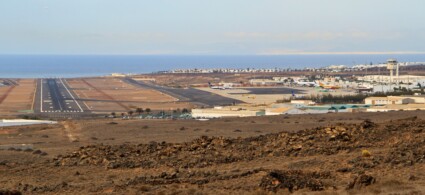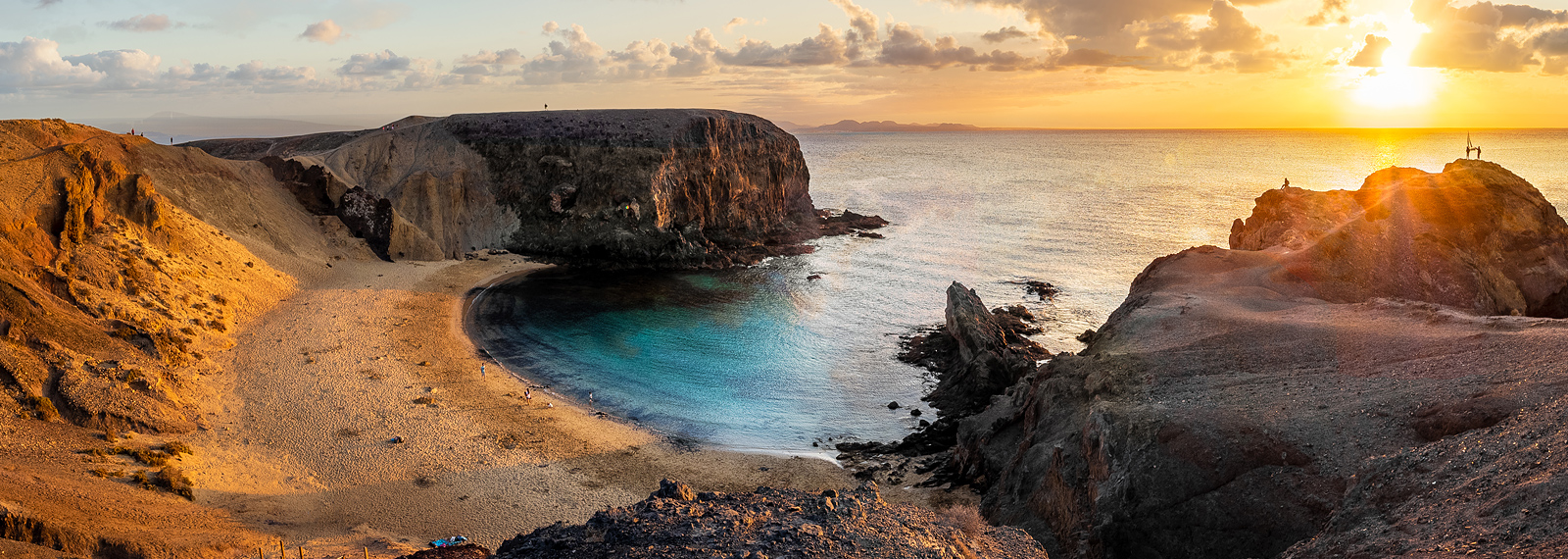

Lanzarote is the easternmost of the Canary Islands. It lies about 125 kilometres from the coast of Africa and 1,000 kilometres from the Iberian Peninsula. It is the fourth largest of the islands of the archipelago and is a popular holiday destination, given its excellent climate, volcanic landscapes, beautiful beaches, the friendly and welcoming spirit of the locals and the moderate prices.
As a rule, Lanzarote enjoys good weather conditions at any time of the year, allowing you to enjoy its beaches even during the winter. From May to October it is almost impossible to find a rainy day, while in winter the weather becomes more unstable – although for the vast majority of days, the sun dominates the scene.
The best months to visit Lanzarote are undoubtedly September and October, when the heat of summer has dissipated a little, the wind is not excessive and the sea is calm, flat and warm.
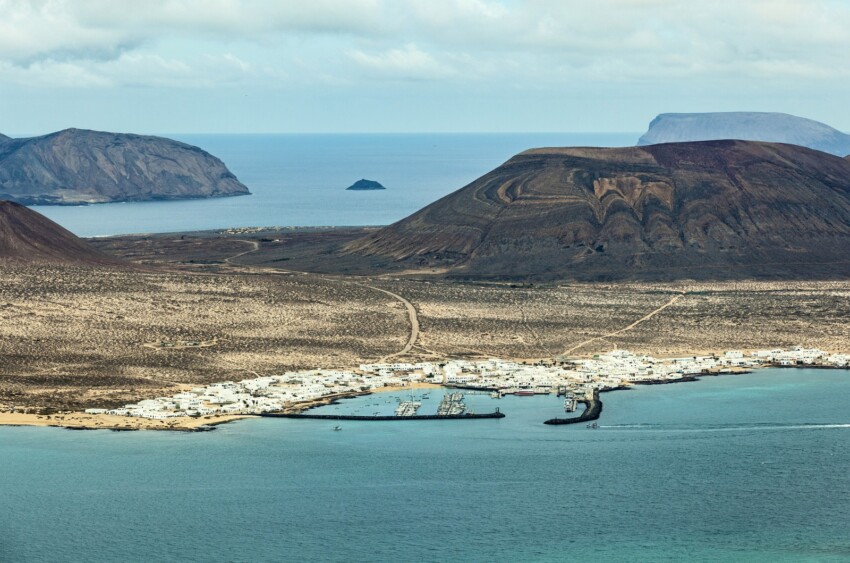
Lanzarote is pure geology, lunar landscapes, transparent water, an oasis of palm trees, where man has managed to coexist harmoniously. Its landscape can be enjoyed all year round. The island has more than 100 volcanoes in 800 square kilometres, which shape the lava landscape making it unique in the world.
There are many surprising sights that will captivate any traveller, thanks above all to Cesar Manrique, who has enriched his native island with an astonishing series of installations and monuments that blend in perfectly with the territory. Especially thanks to this brilliant architect, there are so many things to see in Lanzarote that it is not heresy to say that it is possible to spend an entire holiday in Lanzarote without ever going to the beach.
Among the must-see attractions are the Timanfaya National Park, the Jameos de Agua, the Mirador del Rio, the Jardin de Cactus, the Cueva de los Verdes, but also the typical villages of Playa Blanca, Haria, Orzola and Teguise. Of course, don’t leave Lanzarote without taking a tour of its capital, the charming Arrecife.
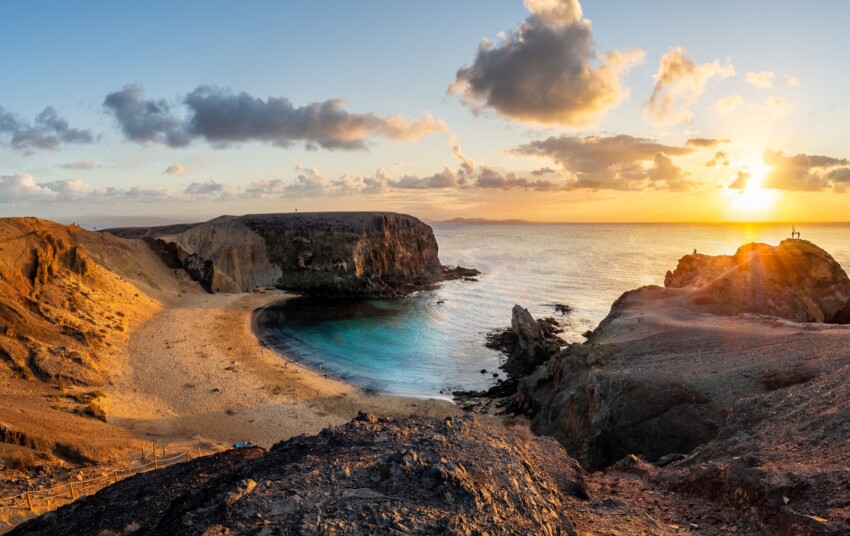
Although we have just stated that it is possible to spend a holiday there without going to the beach, there are so many things to see on the island, Lanzarote is a true paradise for beach lovers. The island is home to almost 100 superb stretches of sand, some of which are considered among the best in the Canaries, such as the huge Famara bay along the rugged north-western coast and the interconnected coves of Papagayo, located near Playa Blanca in the south.
All the main resorts of Puerto del Carmen, Costa Teguise and Playa Blanca boast some excellent, mostly sandy beaches, with sand imported from the Sahara Desert. These are resorts created specifically for tourists.
The Canary Islands are often associated with black sand beaches, but there are few of these on Lanzarote, despite the recent volcanic eruptions on the island. However, if you want to see a typical Canarian beach, go to Playa Quemada.
Apart from the ones most frequented by tourists, you can explore beaches a little off the beaten track, unspoilt and not overrun by structures and buildings.
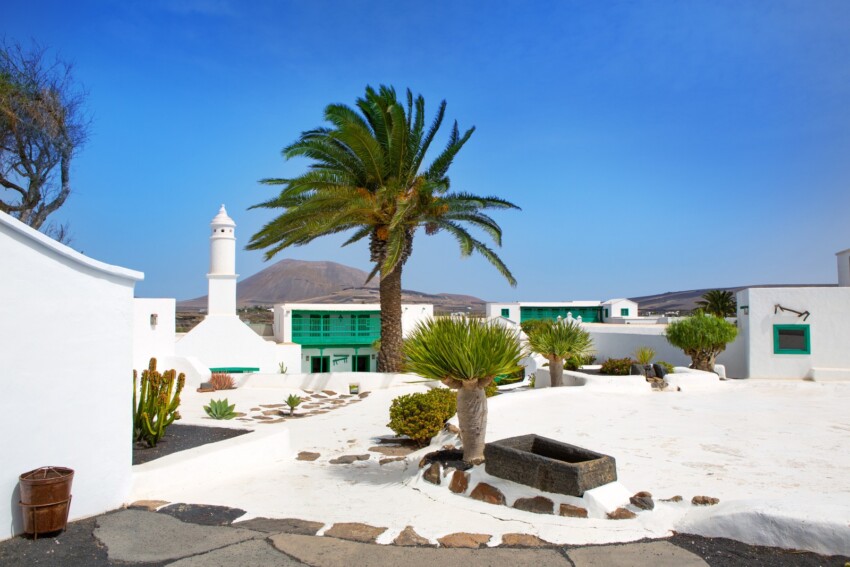
Lanzarote is an inspiring place for every traveller. Its unique volcanic landscape, rich flora and fauna, cultural importance, designation as a UNESCO Biosphere Reserve, and rich marine life have created a different but lasting impression for everyone who has visited Lanzarote or plans a holiday here.
When thinking of the Canaries, it is normal to imagine a series of crowded beaches and coastal resorts. But Lanzarote is not only this. The beauty of the inland areas, often shaped by volcanic phenomena, has created a series of trekking routes that you will be fascinated by.
There are many local agencies that organise exploration walking tours or quad bike trips. The more adventurous can consider undertaking these long walks on their own, thanks also to the excellent directions found on the island.
The landscapes, both inland and coastal, are also popular with those who dabble with a camera for fun or work. The particular colours of this land, in which the black of the volcanic rocks, the blue of the sky, the white of the houses and the green of the palm trees and cacti are predominant, capture the interest of many photographers.
Surfing in Lanzarote is one of the most popular sports. In fact, the island is on the list of the best places on the planet to practice it: the waves here are comparable to those in mythical Hawaii. Besides surfing, both windsurfing, especially when the wind is strong, and kite-surfing are practised. A good area for windsurfing on Lanzarote is Playa de las Cucharas in Costa Teguise.
Finally, let’s not forget snorkelling and scuba diving, unmissable activities that allow you to admire a multitude of marine animals thanks to the transparent waters.
This volcanic island offers a wide range of attractions, including natural wonders such as the Timanfaya National Park and the amazing works of Cesar Manrique. Local agencies will be ready to offer you all kinds of tours and excursions, from private to group tours.
Organised tours cater for everyone’s needs, even families travelling with children. In addition to inland tours, excursions are also organised by sea, to parts of the coast that cannot be reached by land, or to the nearby islands of La Graciosa and Fuerteventura.
All these excursions can be organised on your own, although the efficiency and professionalism of the official guides will make all your trips even more interesting.
Lanzarote, like the other Canary Islands, offers some alternatives for accommodation, mainly hotels, flats and villas. Depending on your holiday budget, you can find the right accommodation in Lanzarote for you.
Hotels can be either inexpensive or luxurious and are often suitable for families looking for comfort. For those who want to immerse themselves in the day-to-day life of the island, staying in a flat can be the right solution: a way to be independent and free to explore all this land.
The luxury alternative to the flat is the villa: there are many elite residences that are also rented out for short periods of time.
The capital of the island is a diverse and interesting place to visit with historical buildings, an art museum and numerous traditional shops as well as large brand-name shops. If you choose to stay in Arrecife, there is a four-star hotel in town that is also useful as a landmark and meeting place, as well as a selection of small family-run hostels.
Playa Blanca is Lanzarote’s newest resort, and is located right on the southern tip of the island, stretching seven kilometres from the beautiful Papagayo beach to the Faro de Pechiguera lighthouse.
Don’t miss the beautiful promenade. Playa Blanca beach is central to the village; there are also many smaller beaches and pretty coves, which can be reached on foot or by taxi-boat service. Both inexpensive accommodation and more luxurious lodgings in high-end residential complexes can be found here.
Playa Blanca appeals to many types of tourists, both those who want to be active and those seeking a relaxing holiday, families and couples.
Puerto del Carmen was once a small fishing village but now stretches six kilometres and the beach is a succession of bathing establishments. It is the seaside resort par excellence on the island, and its location is excellent, close to the airport, but also perfect for sports enthusiasts: the prestigious Ironman Lanzarote event is held here every year.
Accommodation in Playa del Carmen is very much oriented towards independent accommodations with several residential complexes to choose from and some private villas to rent.
Lanzarote is a year-round holiday destination due to its excellent climate, so with airlines flying to the island throughout the 12 months availability is usually good for most dates and even during the high season it is easy to find a direct flight from various airports.
Booking well in advance can get you great fares, with the understanding that during peak season prices tend to rise inexorably. Alternatively, you can book an Iberia flight with a stopover in Madrid.
If you are planning to combine Lanzarote with another Canary Island you might consider a flight to Gran Canaria or Tenerife, as well as ferry connections to the whole archipelago, especially to Fuerteventura which is only a few kilometres away.
Lanzarote can also be reached by sea from the other Canary Islands, with several daily connections.
The magnificent Lanzarote is the closest Canary Island to the European coast. Close is an understatement, as it is about 1000 kilometres from Cadiz and the coast of Andalusia. Compared to the other Canary Islands, Lanzarote is very close to Fuerteventura: the two islands are separated by a strait about 10 kilometres wide.
